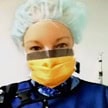-
Asked by 834hemb28 to Jonathan, Kellie, Kevin, Melissa, Stephanie on 23 Apr 2016. This question was also asked by 985hemb29.
-
Kellie Jaremko answered on 23 Apr 2016:
I usually have many projects going at one time. For my most recent clinical study I am trying to see if a different pain medication improves recovery in people who had to have an amputation in the hospital. The data itself is a combination of pain scores, days in the hospital, side effects, and medication doses that each patient received.
For my other screening clinical study I am asking people scheduled for surgery if they have ever used any drugs so I can see how this may change their recovery from surgery.
-
-
Stephanie Moon answered on 23 Apr 2016:
Hi 834hemb28–
I want to find out how viruses and genetic mutations/disorders can make us sick. The data that I have gathered for studying viruses was mostly for determining how gene expression in the cell changes because of a virus infection. We would get a lot of data showing how the human cell responded to a virus infection by turning on certain genes that could get rid of a virus but at the same time could cause a person to feel sick (an immune response). We found that some genes were turned on for too long during an infection and ultimately cause more harm than good (read more here: https://wiselabandfieldblog.wordpress.com/2015/08/20/an-unusual-viral-rna-activity-provides-clues-about-why-its-essential-for-causing-disease/). -
Melissa Wilson Sayres answered on 24 Apr 2016:
Our broad goals are to understand sex-biased evolutionary processes and what consequences those have for human health and medicine. For example, we study how the human X and Y chromosomes have changed over time, and what the consequences of different numbers and types of genes on the sex chromosomes have for humans.
-
Jonathan Jackson answered on 25 Apr 2016:
I work on several very large projects that collects a whole lot of information about people. In order to find out how the brain (and body) changes in the years before a diagnosis of Alzheimer’s disease, we’re taking a “kitchen-sink” approach. That means we collect data about people’s brains in terms of memory tests, mental math, brain scans, and personality measures. But we also look at what medicines people are taking, heart health, diet, genomics, weight, exercise, even sleep patterns! Basically, we’re looking at anything and everything that may play a role in the brain going wrong over time.
-
Kevin Baker answered on 26 Apr 2016:
Simply, I am hoping to get data that can be used to help patients with liver disease or clotting disorders.






Comments